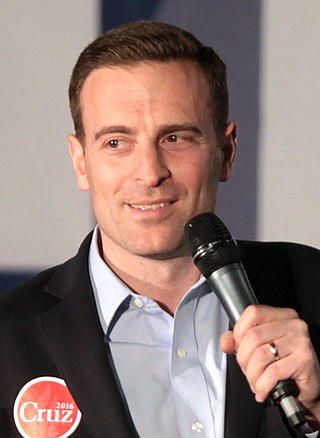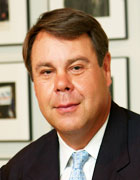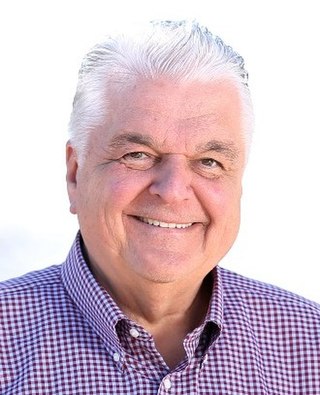
Paul Dominique Laxalt was an American attorney and politician who served as the 22nd governor of Nevada from 1967 to 1971 and a United States senator representing Nevada from 1974 until 1987. A member of the Republican Party, he was one of Ronald Reagan's closest friends in politics. After Reagan was elected president in 1980, many in the national press referred to Laxalt as "the first friend". He was the older brother of writer Robert Laxalt and maternal grandfather of Adam Laxalt, who served as the 33rd attorney general of Nevada from 2015 to 2019.

The 1994 United States Senate elections were held November 8, 1994, with the 33 seats of Class 1 contested in regular elections. Special elections were also held to fill vacancies. The Republican Party took control of the Senate from the Democrats. Like for most other midterm elections, the opposition, this time being the Republicans, held the traditional advantage. The congressional Republicans campaigned against the early presidency of Bill Clinton, including his unsuccessful health care plan. Democrats held a 56-44 majority, after having lost a seat in Texas in a 1993 special election.

The 1986 United States Senate elections were elections for the United States Senate. Held on November 4, in the middle of Ronald Reagan's second presidential term, the 34 seats of Class 3 were contested in regular elections. The Republicans had to defend an unusually large number of freshman Senate incumbents who had been elected on President Ronald Reagan's coattails in 1980. Democrats won a net of eight seats, defeating seven freshman incumbents, picking up two Republican-held open seats, and regaining control of the Senate for the first time since January 1981. This remains the most recent midterm election cycle in which the sitting president's party suffered net losses while still flipping a Senate seat.

The 1976 United States Senate elections was an election for the United States Senate. Held on November 2, the 33 seats of Class 1 were contested in regular elections. They coincided with Democrat Jimmy Carter's presidential election and the United States Bicentennial celebration. Although almost half of the seats decided in this election changed parties, Carter's narrow victory did not provide coattails for the Democratic Party. Each party flipped seven Senate seats, although, one of the seats flipped by Democrats was previously held by a Conservative.

The 1974 United States Senate elections were held on November 5, with the 34 seats of Class 3 contested in regular elections. They occurred in the wake of the Watergate scandal, Richard M. Nixon's resignation from the presidency, and Gerald Ford's subsequent pardon of Nixon. Economic issues, specifically inflation and stagnation, were also a factor that contributed to Republican losses. As an immediate result of the November 1974 elections, Democrats made a net gain of three seats from the Republicans, as they defeated Republican incumbents in Colorado and Kentucky and picked up open seats in Florida and Vermont, while Republicans won the open seat in Nevada. Following the elections, at the beginning of the 94th U.S. Congress, the Democratic caucus controlled 60 seats, and the Republican caucus controlled 38 seats.

The 1970 United States Senate elections was an election for the United States Senate. It took place on November 3, with the 33 seats of Class 1 contested in regular elections. Special elections were also held to fill vacancies. These races occurred in the middle of Richard Nixon's first term as president. The Democrats lost a net of three seats, while the Republicans and the Conservative Party of New York picked up one net seat each, and former Democrat Harry F. Byrd Jr. was re-elected as an independent.

The 1964 United States Senate elections were held on November 3. The 33 seats of Class 1 were contested in regular elections. Special elections were also held to fill vacancies. They coincided with the election of President Lyndon B. Johnson by an overwhelming majority, to a full term. His Democratic Party picked up a net two seats from the Republicans. As of 2023, this was the last time either party has had a two-thirds majority in the Senate, which allowed the Senate Democrats to override a veto, propose constitutional amendments, or convict and expel certain officials without any votes from Senate Republicans. However, internal divisions would have prevented the Democrats from having done so. The Senate election cycle coincided with Democratic gains in the House in the same year.

The 1958 United States Senate elections were elections for the United States Senate which occurred in the middle of President Dwight D. Eisenhower's second term. Thirty-two seats of Class 1 were contested in regular elections, the new state of Alaska held its first Senate elections for its Class 2 and 3 seats, and two special elections were held to fill vacancies.

The 1980 United States Senate election in Nevada was held on November 4, 1980. Incumbent Republican U.S. Senator Paul Laxalt won re-election to a second term. As of 2024, this is the last time that the Republicans have won the Class 3 Senate seat from Nevada. 42 years later Laxalt's grandson and former Nevada Attorney General Adam Laxalt would run to take this senate seat in 2022, but narrowly lost to incumbent Democrat Catherine Cortez Masto.

Adam Paul Laxalt is an American attorney and politician who served as the 33rd Nevada Attorney General from 2015 to 2019. A member of the Republican Party, he was the party's unsuccessful nominee for governor of Nevada in 2018 and for the U.S. Senate in 2022.

Harold Warren Furman II, "Hal" is an American businessman and a former U.S. government official. He co-founded and serves as the chairman and managing director of The Furman Group, a water infrastructure consulting firm based in Washington, D.C.

The 1952 United States Senate election in Nevada took place on November 4, 1952. Incumbent Republican U.S. Senator George W. Malone was re-elected to a second term in office. George Wilson Malone defeated Thomas B. Mechling by a very narrow margin despite George Wilson Malone's fellow Republican Dwight David Eisenhower winning the state over Adlai Stevenson II in a landslide in the concurrent presidential election in Nevada.

The 2018 Nevada gubernatorial election took place on November 6, 2018, to elect the next governor of Nevada. Incumbent Republican Governor Brian Sandoval was ineligible to run for re-election, due to the absolute two-term limit established by the Nevada Constitution. Nevada is one of eight U.S. states that prohibits its governors or any other state and territorial executive branch officials from serving more than two terms, even if they are nonconsecutive.

The 2018 United States House of Representatives elections in Nevada were held on November 6, 2018, to elect the four U.S. representatives from the State of Nevada, one from each of the state's four congressional districts. The elections coincided with the Nevada gubernatorial election, as well as other elections to the United States House of Representatives, elections to the United States Senate and various state and local elections. Primary elections were held on June 12, 2018.

The Nevada general election, 2018 was held on Tuesday, November 6, 2018 throughout Nevada.

The 2020 United States House of Representatives elections in Nevada was held on November 3, 2020, to elect the four U.S. representatives from the state of Nevada, one from each of the state's four congressional districts. The elections coincided with the 2020 U.S. presidential election, as well as other elections to the House of Representatives, elections to the Nevada Senate and various state and local elections.

The 2024 United States Senate election in Nevada will be held on November 5, 2024, to elect a member of the United States Senate to represent the State of Nevada. Incumbent Democratic Senator Jacky Rosen, elected in 2018 over incumbent Republican Dean Heller, is seeking a second term in office. Primary elections are scheduled to take place on June 11, 2024.

The 2022 United States Senate election in Nevada was held on November 8, 2022, to elect a member of the United States Senate to represent the State of Nevada. Incumbent Democratic senator Catherine Cortez Masto won re-election to a second term, narrowly defeating Republican challenger Adam Laxalt. Nevada's election results were slowed due to state law that allowed voters to submit mail-in ballots until November 12, and allowed voters to fix clerical problems in their mail-in ballots until November 14, 2022. No Republican has won this specific U.S. Senate seat since Adam Laxalt's grandfather Paul Laxalt won a second full term in 1980.

The 2022 United States House of Representatives elections in Nevada were held on November 8, 2022, to elect the four U.S. representatives from the state of Nevada, one from each of the state's four congressional districts. The elections coincided with the Nevada gubernatorial election, as well as other elections to the U.S. House of Representatives, elections to the U.S. Senate, and various state and local elections.

The 2022 Nevada Secretary of State election was held on November 8, 2022, to elect the next secretary of state of Nevada.




















